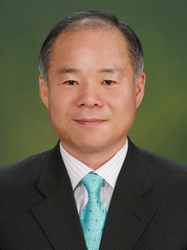 Prof. Ph.D.
Prof. Ph.D.Hio-Jung Shin
Principal InvestigatorPhone: +49-921-55-2584
Fax: +49-921-55-2564
Room: NW I, Room 7.0 01 06
e-Mail: hiojung(at)kangwon.ac.kr
University of Bayreuth
Dr.-Hans-Frisch-Straße 1-3
95448 Bayreuth
Germany
http://www.bayceer.uni-bayreuth.de/
Department of Agricultural and Resource Economics (KNU, Korea)
Department of Plant Ecology (UBT, Bayreuth, guest scientist since February 2012)
Analysis of Benefit Transfer for Water Management in Bukhan River Using Meta-Regression Analysis
Abstract 2011: The purpose of this study was to estimate the magnitude of economic benefits that are justified in transfer to up-stream communities and rural populations for use of Bukhan River water by downstream populations. Alternatives for regional cost-benefit sharing are estimated by meta-regression analysis with models with and without the inclusion of socio-economic variables. Based on these models, an equitable benefit transfer of 14,362 to 31,327 KRW per household per month is obtained in the case of a “revealed preference model” formulation, while 411 - 1,689 KRW per household per month is suggested with a “stated preference model.” The benefit transfer estimated when socio-economic variables are included, are more than four times as much as without them in the stated preference model. With the revealed preference model, the benefits with socio-economic variables are more than twice as much as without them. An important reason why large differences in estimated values for benefit transfer have been reported appears to be the model method used. When applying the study results to the Bukhan River case, 14,362 to 31,327 KRW per household per month as calculated with the revealed preference model are reasonable. Then total benefits paid for water resource use of Bukhan River are calculated to be around 74.6 to 162.8 billion KRW per month with Seoul providing the largest contribution and Incheon the second largest. Benefits to Incheon of 4.1 billion to 8.9 billion KRW, to Gyunggi of 17.0 billion to 37.0 billion KRW, and to Gangwon of 18.6 billion to 40.7 billion KRW per month should be paid by Seoul metropolitan city through such incentives as tradable development rights. Costs for water quality and quantity management should be shared based on the derived benefits indicated. In the case of success with 100 percent benefit transfer, the costs should be paid by the local and/or provincial governments. In the case of success in less than 100 percent benefit transfer, the costs should be determined by agreements between local and/or provincial governments apart from the issues on benefits distribution. The results of our study provide economic indicators useful in the planning of environmental policy and to consider stakeholders' rights within the framework of regional costs and benefits.
Key words: cost-benefit sharing, revealed preferences, stated preferences, benefit transfers
Project description in detail from proceedings of 2011 TERRECO Science Conference GAP
Consortium-based approach to governance and sustainable water management along the Han River
Abstract 2013: The north (Bukhan) and south (Namhan) branches of the Han River with many dams and reservoirs pass through the provinces of Gangwon, Gyeonggi, and Chungcheongbuk as well as the special cities Seoul and Incheon and part of North Korea. Regulatory and property rights, however, currently exist in South Korea only with the national government, making it difficult to resolve water-related disputes among upstream (UC), mid-stream (MC) and downstream (DC) communities. The TERRECO project is viewed as an element that can aid, as a neutral information provider, the new creation of a system-based Han River Governance Committee (HRGC). An initial “Round Table” information exchange between TERRECO and the Gangwon Province governor’s office is in planning for fall of 2013. The activity is viewed as a practical application of the TERRECO paradigm, will be structured as an educational activity, and will contribute to the TERRECO course “Ecosystems, Resource Management and Sustainability.” With scientific evidence related to the complex trade-offs that occur in agriculture versus water-related ecosystem services under the influence of climate and land use change, our goal is to aid in the initiation and to provide information from scenarios to a so-called Han River Governance Committee (HRGC). Stakeholders from UC, MC and DC would participate to solve multilateral disputes among communities and their residents along the Han River. Within this dynamic exchange, impacts and trade-offs tied to specific potential policy decisions would be clarified, and required compensations should be determined. A stepwise procedure is visualized with progressive development in complexity and breadth of Round Table exchanges. (Step 1) Systematically define the important stakeholder groups, determine among these the “Gainers” and “Losers” involved in agriculture versus water quality issues, sort these according to their role in UC, MC and DC. (Step 2) Clarify the economic trade-offs associated with clean water. What actions could be taken? What losses in revenue are associated with these? (Step 3) Evaluate reforestation, change in land use, and technical measures. Who and how much could be paid for related gains in ecosystem services? (Step 4) Examine potential policies and incentive mechanisms. Determine whether equitable sharing of costs and distribution of benefits is possible? (Step 5) Establish a working Han River Governance Committee including the central government, 5 provincial and city governments, and critically important NGO/NPO (modelled after Potomac River Committee in USA). Sustainable resource management requires compromises through which an equitable sharing of costs for acceptable water quality are established. With equitable sharing of costs, benefits from water use will be distributed among upstream, mid-stream and downstream communities equally. By providing information from simulation tools developed for the Soyang Watershed, TERRECO can provide scientific information useful to policy makers and decision-makers. While Soyang Watershed is only a small part of the Han River system, its function as an SES involves in an abstract context the various stakeholders overall, their interests and their concerns. The HRGC initiated through the TERRECO program would, therefore, play a critically decisive role of solving seriously prolonged water disputes among stakeholders along the Han river.
Key words: Property rights, stakeholders, governance, cost sharing, benefit distribution, incentives
Poster Workshop Ecosystem Change and Society, Bayreuth, January 2013
>> Projects
